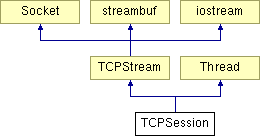
TCPSession Class Reference
The TCP session is used to primarily to represent a client connection that can be managed on a seperate thread. Threaded streamable socket with non-blocking constructor. More...
#include <socket.h>
Inheritance diagram for TCPSession:

Public Methods | |
| TCPSession (Semaphore *start, const InetHostAddress &host, tpport_t port, int size = 512, int pri = 0, int stack = 0) | |
| Create a TCP socket that will be connected to a remote TCP server and that will execute under it's own thread. More... | |
| TCPSession (Semaphore *start, TCPSocket &server, int size = 512, int pri = 0, int stack = 0) | |
| Create a TCP socket from a bound TCP server by accepting a pending connection from that server and execute a thread for the accepted connection. More... | |
Protected Methods | |
| int | WaitConnection (timeout_t timeout = TIMEOUT_INF) |
| Normally called during the thread Initial() method by default, this will wait for the socket connection to complete when connecting to a remote socket. More... | |
| void | Initial (void) |
| The initial method is used to esablish a connection when delayed completion is used. More... | |
| void | Final (void) |
| TCPSession derived objects can be freely created with "new" and safely terminate their "Run" method on their own by self-deleting when the thread terminates. | |
Detailed Description
The TCP session is used to primarily to represent a client connection that can be managed on a seperate thread. Threaded streamable socket with non-blocking constructor.The TCP session also supports a non-blocking connection scheme which prevents blocking during the constructor and moving the process of completing a connection into the thread that executes for the session.
- Author(s):
- David Sugar <dyfet@ostel.com>
Constructor & Destructor Documentation
|
|
Create a TCP socket that will be connected to a remote TCP server and that will execute under it's own thread.
|
|
|
Create a TCP socket from a bound TCP server by accepting a pending connection from that server and execute a thread for the accepted connection.
|
Member Function Documentation
|
|
TCPSession derived objects can be freely created with "new" and safely terminate their "Run" method on their own by self-deleting when the thread terminates.
Reimplemented from Thread. |
|
|
The initial method is used to esablish a connection when delayed completion is used. This assures the constructor terminates without having to wait for a connection request to complete. Reimplemented from Thread. |
|
|
Normally called during the thread Initial() method by default, this will wait for the socket connection to complete when connecting to a remote socket. One might wish to use setCompletion() to change the socket back to blocking I/O calls after the connection completes. To implement the session one must create a derived class which implements Run().
|
The documentation for this class was generated from the following file:
Generated at Fri Mar 23 10:47:56 2001 for CommonC++ by
 1.2.1 written by Dimitri van Heesch,
© 1997-2000
1.2.1 written by Dimitri van Heesch,
© 1997-2000